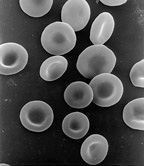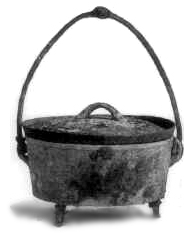Iron deficiency anaemia is when the body doesn't produce enough red blood cells, because there is a lack of iron (نقص الدم - lit. lack of blood or blood loss in Arabic, also called فقر الدم بعوز الحديد). Iron is used by the body to make haemoglobin, which helps store and carry oxygen in red blood cells.
 Haemoglobin transports oxygen from the lungs to the rest of the body. If there is a lack of iron in the blood, the organs and tissues will not get as much oxygen as they usually do.
Haemoglobin transports oxygen from the lungs to the rest of the body. If there is a lack of iron in the blood, the organs and tissues will not get as much oxygen as they usually do.Iron deficiency anaemia affects up to 1 in 20 men and 1 in 20 post-menopausal women (after a woman’s monthly periods have stopped).
Iron deficiency anaemia may be more common in women who are still menstruating (having periods). This is because menstruation and pregnancy can cause iron deficiency.
Most common symptoms of iron deficiency anaemia include:
- tiredness
- lethargy (lack of energy)
- shortness of breath (dyspnoea)
- palpitations (irregular heartbeat)
Less common symptoms of iron deficiency anaemia include:
- headache
- tinnitus, the perception of a noise in one or both ears or in your head that comes from inside your body, such as a ringing in your ears
- an altered sense of taste
- pica, a desire to eat non-food items, such as ice, paper or clay
- a sore tongue
- feeling itchy
- difficulty swallowing (dysphagia)
You may also notice changes in your physical appearance. For example, signs that you may have iron deficiency anaemia include:
- a pale complexion
- an abnormally smooth tongue (atrophic glossitis)
- painful ulcers (open sores) on the corners of your mouth (angular chelosis)
- dry, flaking nails
- spoon-shaped nails
- Animal foods (generally better than vegetarian sources): lamb, shrimp, game, beef, turkey, liver (liver should be avoided during pregnancy due to the high level of vitamin A), kidney, heart, eggs (especially the yolk), sardines, turkey, oily fish (tuna, sardines, pilchards, cockles, clams, oysters, mussels, etc)
- Vegetarian sources: dark-green leafy vegetables (eg. watercress and curly kale), iron-fortified bread, beans & pulses (lentils, chick peas, haricot, kidney, pinto, baked, butter, peas), nuts, seeds, dried fruits (apricots, prunes, raisins, figs, dates), fortified cereals,
- Fruits: orange, orange juice, cantaloupe, strawberries, grapefruit, etc (Vitamin C)
- Vegetables: broccoli, brussel sprouts, tomato, tomato juice, potato, green and red peppers
- Cooking in cast iron (adding something acidic, such as tomato, to get the benefit of the iron)

Things that inhibit the uptake of iron:
- Tea and coffee
- Certain vegetables: chard, beet greens, rhubarb, sweet potato
- Whole grains and bran (unless fortified with iron?)
- Soy products
- Calcium - dairy products (fortified cereals need something that enhances the uptake of its iron, such as a vitamin C rich drink, since it's eaten with milk or yoghurt)
- Spinach - some count it as a source of iron, others as an inhibitor of iron uptake!
- iron-rich?: rich fruit cake, gingerbread, ginger biscuits, curry powder, cocoa, chocolate, black treacle
I was told yesterday that iron deficiency can cause or show through irritability and depression too. For more in-depth reading on the subject, check out Wikipedia.
7 comments:
As salaamu alaykum,
Very informative, ma sha Allah. Thanks for sharing. Shifaki Allah.
Masha Allaah that was a wealth of info in a nutshell. Thanks sis, I think I better becareful, sometimes I feel like that too. May Allaah make it easy on you. Aameen
Wa aleikum salaam
Yes, we all better be careful.
That's why I posted this, to warn sisters... the consequences of leaving it untreated can be very serious (worst case scenarios: blood transfusion, removal of uterus post partum, etc!) - not to mention what constantly feeling tired does to us.
Ameen to your du'aas, sisters. JazaakunnAllahu khayran. Still feeling so weak, I can only pray that I will get better soon, ameen.
jazakallah khair for the info, women in my family have had it so i know how common it can be, pray you feel better soon!
wa iyyaki Minara & ameen.
May Allah bless you with health! My iron was really low and I was offered blood tranfusion but after waiting at the hospital for 4 hours and being told to come bacl the next day without treatment I fixed it my own way!
Eat loads of baby spinch, grated carrot and hummus sandwiches! I used to force a bowl of baby spinch and glass of orange juice whenever i remembered! Dried fruit is good, figs and apricots did me good too.
Alhamdulillah I had it checked just before ramadan and it normal!!
Umm Muhammad Umar
Ameen.
jazaakillahu khayran for the du'aa and your advice, Umm Muhammad Umar.
Post a Comment